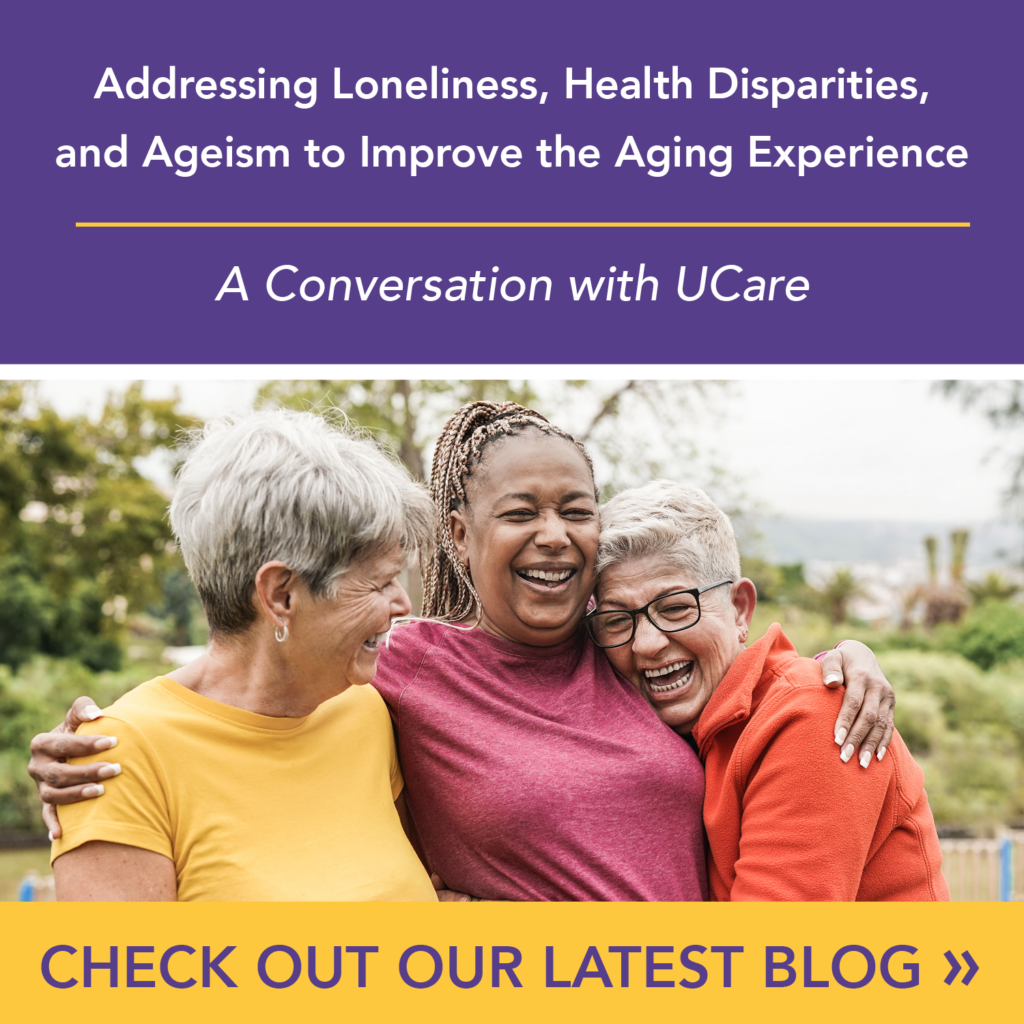
In 2019, Lifespark and UCare, an independent, nonprofit health plan, launched a partnership to improve health and life outcomes for seniors in Minnesota and Western Wisconsin. What drew the two organizations together is a shared passion for helping people age magnificently.
Lifespark spoke with Amy Wickman, RN, Vice President, Clinical Services at UCare, to learn more about the challenges facing seniors today and what UCare is doing to address them.
Gaps and opportunities
“One of the growing challenges we’re seeing in our members is loneliness and isolation,” Amy said. “We know that as people age, their social circles shrink, they may have fewer opportunities to participate in group activities, and often their family members move away.” Another factor is that age-related physical changes, such as hearing loss, decreased mobility, and failing eyesight, can keep people homebound, further isolating them from their community, she said.
A less visible but equally significant challenge is a decline in mental health, which Amy said is often overlooked or minimized in older adults. To better support members in this area, UCare has made it a priority to screen for mental health issues.
“When we reach out to our members, we’re not only assessing their physical health, but also their mental health,” Amy said. Members are asked questions about anxiety, depression, isolation, and loneliness, as well as social factors, including whether they have access to transportation, food, safe housing, caregivers, and a network to support them.
“Often times, people don’t realize they have access to resources through their Medicare plan,” she said. Resources can include hearing aids and technical support to make sure they’re working properly. By identifying gaps and opportunities, UCare’s clinical teams focus on helping members be more independent and successful.
The pandemic effect
While social distancing and lockdowns saved countless lives during the height of the COVID-19 pandemic, a study published by the National Institutes of Health found that the isolation compounded and worsened loneliness among older adults. Negative health impacts included increased risk of high blood pressure, heart disease, obesity, weakened immune system, anxiety, depression, dementia, and even death.
UCare saw similar declines. “Members were cut off from friends and family, increasing their feelings of loneliness and loss, especially for those who couldn’t visit loved ones in the hospital or say good-bye,” Amy said, adding that delays in preventive care, such as cancer screenings, immunizations, and wellness checks, also contributed to health declines.
Reducing health disparities
Making sure members stay on track with their preventive care is a major focus of the organization’s commitment to reducing health disparities. “By analyzing the data, we’re able to identify populations that have gaps in care,” Amy said. “From there, we can tailor interventions and solutions to support these communities.”
UCare has been looking beyond traditional medical care to focus on and address social drivers of health—nonmedical influences that can affect health outcomes. “Environmental factors, such as access to food, housing, safety, transportation, and social needs, have a huge impact on health, because when these needs aren’t met, it’s very hard for people to focus on their medical care,” Amy said.
Impacts of ageism
Stereotypes about older adults—that they’re slow, incapable, or out of touch—are damaging to our members’ emotional and physical health, Amy said. “When health care workers act on these stereotypes, they’re not only being disrespectful, they’re also taking away the client’s voice,” she said.
Lack of accommodation for people who may be hard of hearing, have poor vision or cognitive decline is another form of ageism. “One of the ways to address this problem is by educating providers to be more collaborative in their interactions with clients, to respect their autonomy and independence, and to focus on their clients’ capabilities rather than their limitations,” Amy said.
Optimistic outlook
Although there are still plenty of challenges ahead, Amy said she feels optimistic about 2024. “There’s more attention and action on advancing health equity and fighting ageism, and a heightened focus on innovative solutions that enable the elderly to remain longer in their homes,” she said. “We’re also seeing new treatments for chronic diseases and emerging solutions for virtual care.”
Another intriguing development is the use of technology to combat loneliness and isolation. “In addition to animatronic pets and babies, single-button radios, and voice-controlled alarm clocks, we have a plan to pilot GrandPad, a tablet designed for older adults,” she said. “It’s built on a tech platform that makes it easy for people to chat with friends and family, play games with others in their community, and stay connected even when they’re physically distant.”
Whatever the future brings, Amy said she looks forward to exploring new ways of supporting the independence, autonomy, and quality of life of older adults. “It’s also what our partnership with Lifespark is all about,” she added. “Together, we are improving the health of communities, empowering people to age magnificently, and addressing those barriers like loneliness, health disparities, and ageism that get in the way.”
For tips on helping your loved ones Age Magnificently, download our free eBook:


